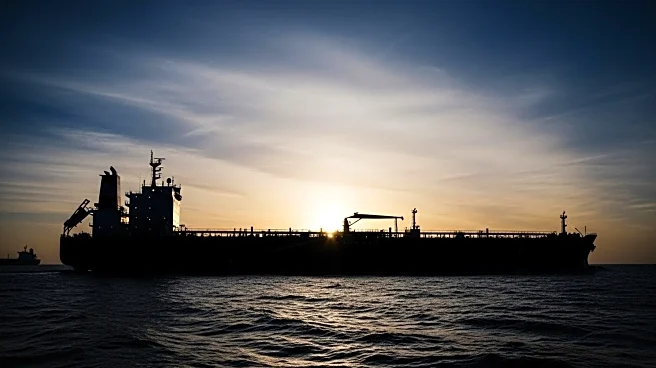What is the story about?
What's Happening?
Saad Rahim, the chief economist at Trafigura, has reported a significant increase in the shadow fleet of oil tankers due to Western sanctions imposed on Russia following its invasion of Ukraine. This fleet is crucial for maintaining the flow of Russian crude oil to global markets despite efforts to curb Moscow's oil revenue. Rahim shared these insights at the APPEC conference in 2025, noting that while the growth of the shadow fleet has slowed this year, it continues to expand as new vessels replace those that have been blacklisted. Additionally, Rahim commented on the limited impact of U.S. tariffs on global economic growth and fuel demand, suggesting that pre-tariff inventories are helping companies manage costs without passing them on to consumers.
Why It's Important?
The expansion of the shadow fleet underscores the challenges in enforcing sanctions against Russia, as it allows the country to circumvent restrictions and continue exporting oil. This development has implications for global oil markets, potentially stabilizing Russian oil revenues despite international efforts to reduce them. Furthermore, the limited impact of U.S. tariffs on demand highlights the complexities of trade policies and their delayed effects on the economy. The situation could influence future policy decisions regarding sanctions and tariffs, affecting global trade dynamics and economic strategies.
What's Next?
As the shadow fleet continues to grow, international bodies and governments may need to reassess their strategies for enforcing sanctions and consider additional measures to effectively limit Russian oil exports. The ongoing situation could lead to increased scrutiny and regulation of maritime activities to prevent sanction evasion. Additionally, the potential stagnation in U.S. oil production due to decreased rig counts may prompt discussions on energy policy and investment in alternative energy sources.
Beyond the Headlines
The growth of the shadow fleet raises ethical and legal questions about the enforcement of international sanctions and the role of global trade networks in facilitating or hindering such efforts. It also highlights the resilience of the oil market and the adaptability of countries facing economic restrictions. Long-term, this situation could influence the geopolitical landscape, affecting alliances and trade relationships.

















